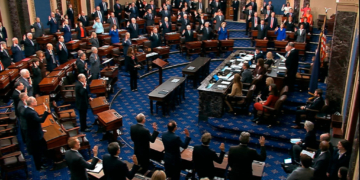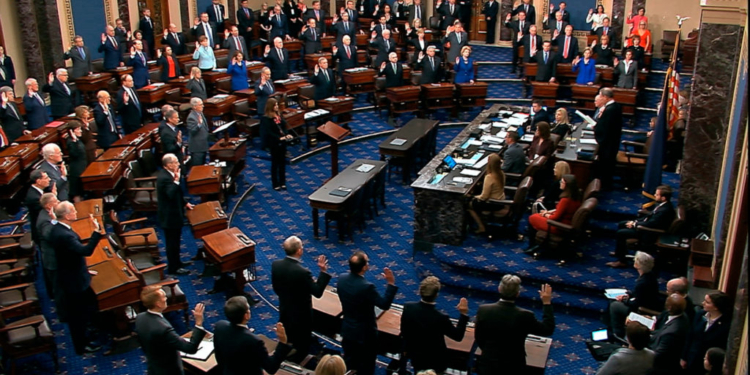The Senate passed a legislative package on Tuesday that would shield underage social media users from harmful content and bar platforms from harvesting minors’ personal user data for advertising.
The Kids Online Safety Act (KOSA) and the Children’s Online Privacy Protection Act (COPPA) both passed the Senate in a 91-3 vote. 47 Republicans, 47 Democrats and three independents united to pass the package, with Democratic Sen. Ron Wyden of Oregon, Republican Sen. Rand Paul of Kentucky and Republican Sen. Mike Lee of Utah voting against the bills.
Democratic Sen. Ed Markey of Massachusetts first introduced COPPA in 1998 when he was a House member, has since reintroduced the bill over two decades later in order to “evolve” and “meet the reality of today’s digital landscape” and is cosponsored by Louisiana Republican Sen. Bill Cassidy, along with over a dozen other lawmakers. The revamped KOSA legislation was introduced by Democratic Sen. Richard Blumenthal of Connecticut, with Sen. Marsha Blackburn of Tennessee as a cosponsor, among others.
KEY VOTE
Heritage Action SUPPORTS the Kids Online Safety Act (S. 1409) and the Children and Teens’ Online Privacy Protection Act (S. 1418).
This landmark package protects American children and curbs the dangerous power of Big Tech companies.https://t.co/p76G9xGAkS pic.twitter.com/sR9LhpXgZR
— Heritage Action (@Heritage_Action) July 25, 2024
A revised COPPA would ban targeted advertising towards minors and prohibit the collection of personal data from underage users, according to a press release. The bill would also create an “eraser button,” which allows children to delete their personal information from the platform.
“Big Tech is knowingly fueling a mental health crisis in this country by exploiting kids and teens just so they can make more money. It’s Congress’s job to stand up for young people and put an end to this,” Markey said in a press release. “I am proud of the protections guaranteed by my 1998 law, COPPA, but the fact remains that today’s online guardrails were written before the invention of the iPhone. The law has to evolve to meet the reality of today’s digital landscape. We won’t address the threats to young people if we don’t stop the data practices at the root of the problem.”
Blumenthal introduced KOSA in May of 2023, which requires social media platforms to provide minors with safeguards that restrict access to their personal data and provides parents with tools to moderate their child’s platform usage, according to the bill summary.
“The bipartisan Kids Online Safety Act (KOSA), which is supported by over half of the U.S. Senate, provides young people and parents with the tools, safeguards, and transparency they need to protect against online harms,” Blumenthal said in a press release. “The bill requires social media platforms to put the well-being of children first by providing an environment that is safe by default.”
Blumenthal’s legislation has drawn the ire of some senators who cite concerns regarding freedom of speech and government overreach.
The bill would allow a state attorney general to take action if they have a “reason to believe that an interest of residents of the State has been or is threatened or adversely affected by the engagement” with social media content, according to the bill text.
“This is insane,” Paul said during a floor speech on July 25. “This bill is not well thought out, this bill is Pandora’s box for censorship. In truth, this bill opens the door to nearly limitless content regulation.”
Paul described a “self-policing effect” that could take place as a result of these new regulations and standards.
“This bill does not merely regulate the internet, it threatens to stifle important and diverse discussions that are essential to a free society,” Paul said during the floor speech.
Other Senators maintain that the bill is not susceptible to bias from attorneys general. Blumenthal insists that there are safeguards in place to prevent content censorship or first amendment violations.
“The Kids Online Safety Act does not give state Attorneys General or FTC the power to bring lawsuits over content or speech,” Blumenthal said in a press release. “The Kids Online Safety Act would not censor, block, or remove any content from the internet. The Kids Online Safety Act targets the harms that online platforms cause through their own product and business decisions – like how they design their products and applications to keep kids online for as long as possible, train their algorithms to exploit vulnerabilities, and target children with advertising.”
A source familiar with the bill, who is not authorized to speak publicly, told the Daily Caller News Foundation that there will be a standard of enforcement to ensure bias is not an issue.
“The updated draft also rests enforcement of the duty of care on the Federal Trade Commission to ensure that there is a uniform standard in the enforcement of the provision, rather than differing interpretations for each state,” the source close to the issue told the DCNF.
This legislation also faced scrutiny from some LGBTQ groups who shared Paul’s concerns about censorship. A coalition of over 90 LGBTQ groups sent a letter to Democratic Majority Leader Chuck Schumer in November of 2022 expressing their opposition to the bill.
“Online services would face substantial pressure to over-moderate, including from state Attorneys General seeking to make political points about what kind of information is appropriate for young people,” the letter reads. “At a time when books with LGBTQ+ themes are being banned from school libraries and people providing healthcare to trans children are being falsely accused of ‘grooming,’ KOSA would cut off another vital avenue of access to information for vulnerable youth.”
The bill has received an onslaught of support from conservative organizations like the Heritage Foundation and America First Policy Institute.
“Under current law, social media platforms evade compliance by writing in their policy that users under age 13 are prohibited from using their services, however they do very little to enforce the policy,” the Heritage Foundation said in a press release. “Nearly 70% of children under age 13 use social media. COPPA 2.0 better protects America’s children by increasing the age of those covered by the law’s protections to 16 and puts social media platforms on the hook for compliance.”
Featured image credit: (Senate Television)
All content created by the Daily Caller News Foundation, an independent and nonpartisan newswire service, is available without charge to any legitimate news publisher that can provide a large audience. All republished articles must include our logo, our reporter’s byline and their DCNF affiliation. For any questions about our guidelines or partnering with us, please contact [email protected].

















 KEY VOTE
KEY VOTE 









 Continue with Google
Continue with Google